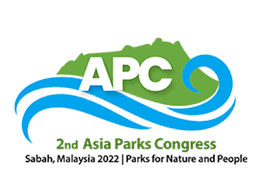
2nd Asia Parks Congress calls for ambitious, fair and effective nature conservation | IUCN
Over 1,200 participants from 49 countries met in Kota Kinabalu from 24-29 May 2022 for the 2nd Asia Parks Congress, jointly convened by Sabah Parks, Malaysia and IUCN. One of the first, large, in-person and virtual environment-related gatherings to be held in Asia since the start of the Covid-19 pandemic, the Congress attracted participants from across Asia and beyond, representing government agencies, NGOs, international organisations, youth, Indigenous peoples and local communities, academia and the private sector. A rich programme of plenaries, working groups, pavilions, events, a special Indigenous peoples' and local communities' forum, and a youth forum discussed and proposed solutions to the most pressing issues facing the conservation of nature in Asia today.
Under the theme of Parks for People and Nature, the Congress identified the most important actions needed in the next decade to strengthen systems of protected and conserved areas across the region, and to contribute to the achievement of the post-2020 Global Biodiversity Framework being negotiated under the Convention on Biological Diversity.
“The Congress was unique in that it convened voices from Indigenous peoples as well as youth, and acknowledged the need to go beyond business as usual to strengthen parks for biodiversity conservation and for human well-being”, said Dr Madhu Rao, Chair of the IUCN World Commission on Protected Areas (WCPA).
Amongst other achievements, the Congress celebrated the inscription of Sabah’s Sugud Islands Marine Conservation Area (SIMCA) on the IUCN Green List – the first marine protected area to receive this recognition in Asia. The Congress also led to the launching of a new Asian youth network on protected areas and the development of many new collaborative efforts, including a new partnership between Sabah Parks and the Korea National Park Service.
The delegates agreed on a Kota Kinabalu Declaration – a powerful statement that seeks to bring key issues from Sabah to the world. The Declaration calls on Asian and global leaders to negotiate strong global targets for protected and conserved areas. These should be implemented with sufficient financial resources to ensure fair and effective results for people and nature. The Declaration focused in particular on the roles of Indigenous peoples and some local communities as customary owners, and custodians, of biodiversity and socio-ecological well-being. The Declaration also recognises the importance of the full, effective, and meaningful participation of Indigenous peoples and local communities in policy making arenas that have the potential to impact on their collective and individual rights, and on their lands, territories, and resources.
Dr Maklarin Lakim, Director of Sabah Parks, said: “We have been inspired by the lessons and experiences that were shared with us over the five days of the Congress. Sabah is committed to achieving the 30 x 30 target; we hope to move forward with the creation of a number of new protected areas in the near future, and in particular, are currently making good progress with the establishment of two new marine protected areas.”
As the delegates head home - many with new friends and new experiences of nature from site visits to local parks, cultural areas and ecotourism centres - they will take the Kota Kinabalu Declaration with them and help promote its key messages to their peers and policy-makers across Asia.










Add new comment